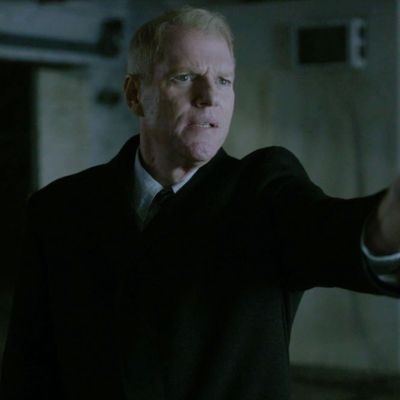
The heart of The Americans series finale, which aired Wednesday night, is a single, stripped-down scene in a dank parking garage. Here, the lies that festered between two friends — the conflicted Russian spy Philip Jennings (Matthew Rhys) and the obsessively focused FBI agent Stan Beeman (Noah Emmerich) — erupt into view, revealing the knotted emotional terrain that unites these two men.
The Americans is a series primed to elude expectations, trading the typical thrills associated with espionage dramas for insightful explorations into marriage and the mutable nature of identity. What makes the garage scene the most haunting aspect of the finale is ultimately what made the series a uniquely bruising experience over the course of its six seasons: It deeply considers the price and power of true intimacy. The scene also distills the most intriguing aspects of the show: tension that bites, a clever use of silence and sound design, delicately fine-tuned performances, directorial choices that privilege the subtle gestures of the actors, and an astute understanding of the weight of history both personal and global. All of these traits — especially the raw, nerved vulnerability that defines the performances by Rhys and Emmerich — work in concert to plumb the murky depths of male vulnerability, loyalty, and the price of intimacy itself.
In many ways, the entire series has led to this moment. While Philip initially befriended Stan to coax FBI information from him and maintain the cover he built with Elizabeth as a normal, all-American family, their relationship gradually became genuine. Over games of squash, EST classes, and commiserating about their familial dilemmas with beers in hand, Philip opened up to Stan more than he did anyone, save for Elizabeth. Their moments together carry a blistering vulnerability that grows all the more heart-wrenching as the show builds toward its end, with much of the sixth season taking great pains to slowly introduce fissures in their friendship. The seventh episode, “Harvest,” takes place during the Thanksgiving holiday Philip leaves to follow Elizabeth under the cover of a business trip. But Stan senses that Philip is hiding something. He pleads with his friend, as much as a man not prone to naked emotion can do.
There’s a moment when Philip’s face goes slack, when he looks away from Stan as if the weight of his real secret is too punishing to bear. “I’ve been wanting to tell you,” Philip begins before pausing. Of course, he disguises his true stress as merely a by-product of his travel agency’s mounting failures. His pause before launching into this almost convincing lie, which soon haunts Stan enough that he launches an off-hours investigation. Later in “Harvest,” he even breaks into the Jenningses’ home looking for anything to allay the suspicions now haunting his waking moments. He stares at a family picture of Philip, Elizabeth, Paige, and Henry, their faces bright with hope and possibility as the dying warning of William Crandall (Dylan Baker) echoes in his mind: “A couple kids … American dream … never suspect them … she’s pretty … he’s lucky.” The garage scene in the finale works because of moments such as this one, in which quiet revelations and unspoken questions build to create a miasma of dread.
It is Stan’s desire to be proven wrong about the family he’s grown to love so deeply that leads him to follow the Jenningses to Paige’s apartment, as they attempt to flee with her to Russia. They have narrowly escaped capture so far, but there, in a dank parking garage during the dead of night, Stan stands between them and their narrowing hope of making it to Russia to attain something akin to freedom.
When Stan confronts them to probe their motives — first anxiously, then marked by barely concealed rage — it’s clear that something painfully intimate is at stake. Paige tries to feign being ill. Elizabeth and Philip are more convincing in their lies, their voices nonchalant as they try to frame Stan’s interrogation as a mere misunderstanding. When Stan whips out his gun, anger rising in his voice, Philip proves just how remarkable a liar he truly is: His voice frantic, he cowers as if staring down a barrel is new to him. In watching and rewatching this moment, I realized the key to understanding the scene is in tracking how and why Philip lies.
The filmmaking allows this scene to operate as an artful dance of loyalty and revelations among the actors, with Rhys and Emmerich being focal points. The scene is bare of music until the closing moments, as the Jenningses slowly drive away, exchanging looks of pained understanding with Stan. Directorially, many shots focus on the actors’ faces and bodies against the sparse background of the parking garage. This gives an added weight to the story told by Rhys’s body as he pivots between aww shucks confusion, practiced fear, and confessional yearning.
Stan’s devastation leads him to veer from making threats toward the Jenningses to questions of a more emotional sort, like when he simply asks “Henry?” It’s a question ripe with the desire to understand how deep this betrayal goes. It’s his love for the family that leads him to stand frozen when Philip first mutters, crestfallen, “We were just doing a job.” Questions linger in the air between them about loyalty and honesty and how much of their relationship was real. When did things shift from being a job to being a genuine friendship? Instead of being asked outright, it is Emmerich’s face, a wrenching portrait of a man whose entire world has been upended, that does the talking.
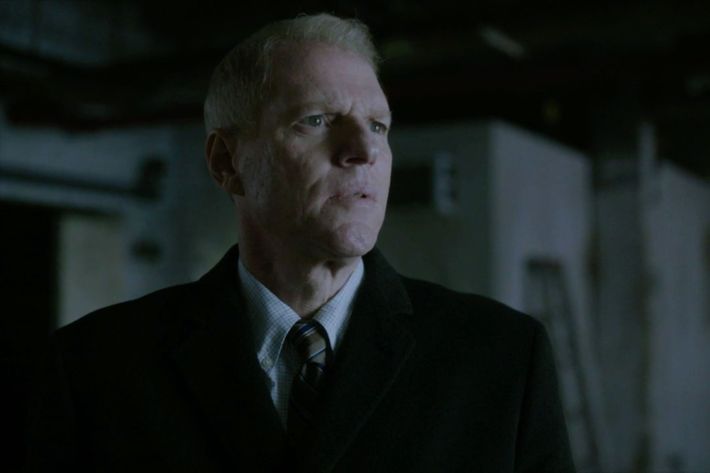
Of course, Stan has been at this precipice before. He’s no stranger to choosing between loyalty for someone he loves and the oath he’s sworn as an FBI agent. Emmerich is an actor who can, with a subtle knot of his brow and gentle crumbling of his posture, speak volumes about the impossible decision Stan faces. He plays Stan’s anger with an undercurrent of tenderness and confusion. At times, it looks like he’s searching Philip’s face for answers he knows he’ll never receive. A lesser series would use this scene to interject bloody vengeance. Instead, it isn’t the potential of violence that grants this scene its tension, but the promise of heartbreak. But while Emmerich’s performance is a stellar portrayal of this heartbreak and confusion that comes with a reality-shattering betrayal, Rhys is the true star of this scene.
Since its beginning, The Americans has complicated and subverted the TV anti-hero archetype. While Elizabeth is steely and exacting, Philip wears his wounds more readily; in openly doubting their cause, he demonstrates the harrowing emotional damage that comes with enacting the violence that more typical and one-dimensional anti-heroes revel in. Rhys’s performance creates an anti-hero defined by his contradictions and vulnerabilities. “You were my only friend in my whole shitty life. All these years, my life was the joke, not yours,” Philip says before revealing how he quit his work as a spy. Instead of cowering or begging or turning to violence, he bares his soul.
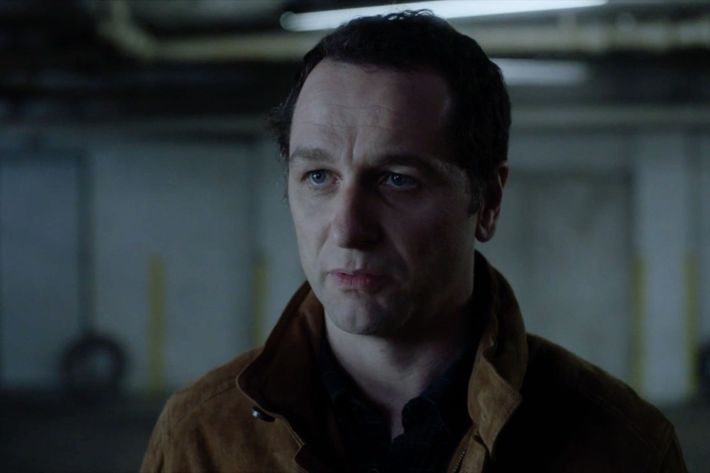
Watching how Philip’s body slumps when he discards his ruse, how his voice grows weary, and how his eyes brim with sorrow when he finally reveals the truth to Stan is both an acting master class and a sincere elegy for a friendship making its final gasps. Has there ever been a more soulful rendition of the anti-hero on television? Rhys has shown, over the course of the show’s six seasons, how history is etched in a person’s flesh. Furrowed brows, softened posture, and pained smiles accumulate to create a rich portrait of man overcome with anguish. In the garage scene, Rhys imbues Philip’s words and gestures with the weight of history. His softening face and tearful glances take on a double meaning: He’s both mourning this friendship and grappling with the void it will soon leave behind. His ability to unravel the entire internal life of his character with subtle, devastating shifts in his stance and gait are remarkable. If this doesn’t nab Rhys an Emmy, I don’t know what will.
“It seemed like the right thing to do for my country. I kept doing it. Telling myself that it was important,” Philip says, his voice tearful. “I have to run away from the place I’ve lived for the past … for so many years.” Notably, Philip isn’t wholly honest with Stan. Look at the way he and Elizabeth lie when Stan needles Paige about the deaths caused by Soviet agents: The shift in their expressions, particularly Philip’s exaggerations, signals that they are slipping their carefully crafted masks back on. Philip lets his voice trail off instead of giving firm answers about how long they’ve been in America or other more revealing facts, even as he seeks to be truly unvarnished with Stan. Despite this clever editing of the more brutal facts of Philip’s life, his body tells a truth about the loneliness that gnaws at him, and his guilt over the blood he’s spilled.
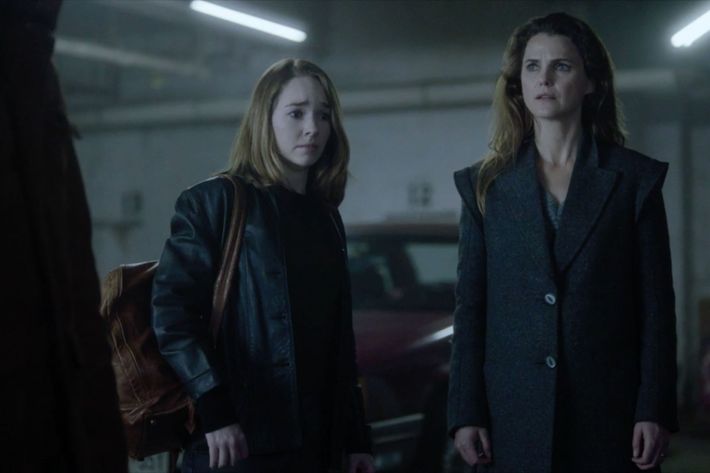
Likewise, the way Russell quietly goes rigid, her body as sharp as the edge of a blade, speaks to the truth of her character’s determination. She is in pure kill mode. Yet, her face softens as Elizabeth listens to her husband bare untold depths she never considered, which further supports how revelatory Philip’s confession is. Their conversation eventually turns to Oleg’s arrest, his dead drop to Philip, and the Center’s plot to take down Soviet leader Mikhail Gorbachev. But these concerns are an afterthought to the white-knuckled emotional catastrophe that defines the scene. Ultimately, Stan’s love for Philip and his family, with his face contorted by shock and sadness, leads him to stand aside, letting the Jennings family go free to an uncertain future. As Matt Zoller Seitz writes in his review of the finale, “Maybe it’s the responsibility they entrusted him with, a sacred duty that transcends nationality, patriotism, and national security: Henry is like a second son to Stan, and since the kid’s biological parents can either flee or go to prison, he does the impossible thing and stands aside, letting them exit the stage one final time.” The final image of this scene is Stan in silhouette, his lone figure framed by the yawning opening of the garage.
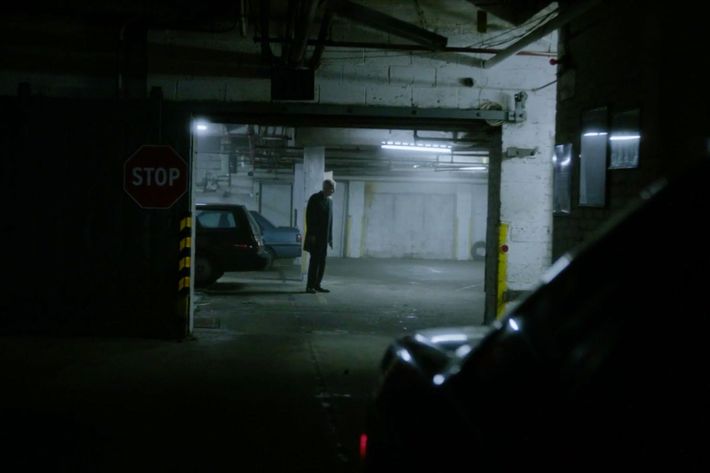
Stan wants answers for things Philip can’t even figure out for himself. He’s left with the responsibility of caring for Henry, the suspicion that Renee may be a Russian spy, and the horror of losing his closest friend to a cause he’s spent years desperately trying to fight. Meanwhile, Philip is left with a terrifying sense of yearning, as his life as a Soviet spy has stripped him of everything save for his marriage. So much of the finale is singed in my memory, but it’s the aching vulnerability and unspoken resolution between Philip and Stan in this scene that truly haunts.


